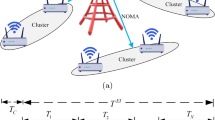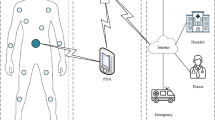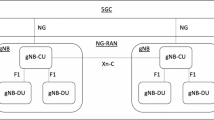Abstract
In this paper, our previous work of Load-Based Power Saving (LBPS) for energy saving at the user side is extended to support integrated sleep scheduling for BS, RS, and MSS in the IEEE 802.16j Multi-Hop Relay Network. Topology-dependent time frame structure is adopted in our design to reduce the transmission delay in the relay network, in which the number of relay zone (for transmission over the relay link) depends on the hop count of RS in the network. Focused on non-real-time traffic, two LBPS schemes, namely LBPS-Aggr-MR and LBPS-Merge-MR, are proposed. Simulation study shows the proposed LBPS schemes significantly outperform the standard Type I PSC in terms of power saving efficiency.



















Similar content being viewed by others
References
Zeller, D., Blume, O., & Ferling, D. (2010). Challenges and enabling technologies for energy aware mobile radio networks. IEEE Communications Magazine, 48(11), 66–72.
Wang, X., Vasilakos, A. V., & Chen, M. (2012). A survey of greek mobile networks: Opportunities and challenges. Mobile Networks and Applications, 17(1), 4–20.
Zhang, F., Todd, T. D., Zhao, D. & Kezys, V. (July 2004) . Power saving access points for IEEE 802.11 Wireless Network Infrastructure. In Proceedings of the 2004 IEEE Wireless Communications and Networking Conference (WCNC 2004), (Vol. 1, pp. 195–200).
Kholaif, A. M., Todd, T. D., Koutsakis, P. & Smadi, M. N. (April 2008). QoS-Enabled power saving access points for IEEE 802.11e networks. In Proceedings of the 2008 IEEE Wireless Communications and Networking Conference (WCNC 2008), pp. 2331–2336.
Marsan, M. A., Chiaraviglio, L., Ciullo, D., & Meo, M. (Aug 2009). Optimal energy savings in cellular access networks. In Proceedings of the 2009 IEEE international conference on communications (ICC 2009), pp. 1–5.
Saker, L., Elayoubi, S. E. & Chahed, T. (July 2010). Minimizing energy consumption via sleep mode in green base station. In Proceedings of the 2010 IEEE Wireless Communications and Networking Conference (WCNC 2010), pp. 1–6.
Yang, C. C., Mai, Y. T., Chen, J. Y., Shen, Y. S., & Kuo, Y. C. (2012). LBPS: Load-based power saving in the IEEE 802.16e network. Computers and Electrical Engineering, 38(4), 891–905.
Yang, C. C., Mai, Y. T., Chen, J. Y., & Kuo, Y. C. (June 2012). Integrated load-based power saving for BS and MSS in the IEEE 802.16e network. Proceedings of the international conference on advancements in information technology, pp. 2–3, Hong Kong.
IEEE Std. 802.16-2009 (May 2009). IEEE Standard for local and Metropolitan Area Networks part 16: Air interface for broadband wireless access systems.
IEEE Std. 802.16j-2009 (June 2009). IEEE Standard for local and Metropolitan Area Networks part 16: Air interface for broadband Wireless Access Systems Amendment 1: Multiple relay specification.
Lu, H.-C. & Liao, W.(April 2011). On cooperative strategies in Wireless Relay Networks. In Proceedings of the 2011 IEEE international conference on computer communications (INFOCOM 2011), pp. 531–535.
Liu, Z., Chen, C., Li, Y., Liu, Q., & Zhuang, H. (May 2010). Cooperative relay selection strategies in two-hop IEEE 802.16 relay networks. In Proceedings of the 2010 2nd international conference on future computer and communication (ICFCC), pp. 504–508.
Ding, L., Tao, M., Yang, F., & Zhang, W. (June 2009). Joint scheduling and relay selection in one- and two-way relay networks with buffering. Proceedings of the 2009 IEEE international conference on communications (ICC), pp. 1–5.
Saeed, R. A., Al-Talib, S. A., Ahdal, T. A. A., Mohamad, H., Abbas, M., Ali, B. M., et al. (May 2010). Adaptive RS-group scheduling for WiMAX multihop relay. In Proceedings of the 2010 international conference on computer and communication engineering (ICCCE), pp. 1–5.
Ohno, Y., Shimizu, T., Hiraguri,. T., & Nakatsugawa, M. (April 2009). Novel frame structures to improve system capacity and latency performance of a time-division duplex multihop relay Wireless Access System. In Proceeding of the 2009 IEEE conference on Wireless Communications & Networking Conference (WCNC 2009), pp. 1–6.
Wang, T. C., Chang, S. Y., & Wu, H.-C. (2009). Optimal energy-efficient pair-wise cooperative transmission scheme for WiMax Mesh Networks. IEEE Journal on Selected Areas in Communications, 27(2), 191–201.
Akhtar, A. M., Nakhai, M. R., & Aghvami, A. H. (2012). Power aware cooperative routing in Wireless Mesh Networks. IEEE Communications Letters, 16(5), 670–673.
Akhtar, A. M., Nakhai, M. R., & Aghvami, A. H. (June 2012). Power saving cooperative path routing in Static Wireless Networks. In Proceedings of the IEEE international conference on communications (ICC), pp. 5906–5910.
Chen, S., & Muntean, G.-M. (June 2012). E-Mesh: An energy-efficient cross-layer solution for video delivery in Wireless Mesh Networks. In Proceedings of the IEEE international symposium on broadband multimedia systems and broadcasting (BMSB), pp. 1–7.
Nieminen, J., Paloheimo, H., & Jantti, R. (March 2010). Energy-adaptive scheduling and queue management in wireless LAN mesh networks. In Proceedings of the 5th annual ICST Wireless Internet Conference (WICON), pp. 1–9.
Badawy, G. H., Sayegh, A. A., & Todd, T. D. (2010). Energy provisioning in solar-powered Wireless Mesh Networks. IEEE Transactions on Vehicular Technology, 59(8), 3859–3871.
Pareit, D., Lannoo, B., Moerman, I., & Demeester, P. (2012). The history of WiMAX: A complete survey of the evolution in certification and standardization for IEEE 802.16 and WiMAX. IEEE Communications Surveys & Tutorials, 14(4), 1183–1211.
IEEE Std. 802.16m-2011 (May 2011). IEEE Standard for local and metropolitan area networks part 16: Air interface for broadband Wireless Access Systems Amendment 3: Advanced air interface.
Varshney, U. (2012). 4G Wireless Networks. IT Professional, 14(5), 34–39.
3GPP TS 36.300 (March 2011). Evolved Universal Terrestrial Radio Access (E-UTRA) and Evolved Universal Terrestrial Radio Access Network (E-UTRAN). Rel. 10, v10.3.0.
Bontu, C., & Illidge, E. (2009). DRX Mechanism for power saving in LTE. IEEE Communications Magazine, 47(6), 48–55.
Author information
Authors and Affiliations
Corresponding author
Additional information
This work was supported in part by the National Science Council, Taiwan, R.O.C., under Grant No. NSC 101-2221-E-260-025.
Part of the research work in this paper has been published in Proc. of the IAENG International Conference on Communication Systems and Applications (International MultiConference of Engineers and Computer Scientists, IMECS), 13–15 March, 2013, Hong Kong.
Rights and permissions
About this article
Cite this article
Yang, CC., Chen, JY., Mai, YT. et al. Load-Based Power Saving in IEEE 802.16j Multi-Hop Relay Networks. Wireless Pers Commun 77, 1885–1903 (2014). https://doi.org/10.1007/s11277-014-1614-5
Published:
Issue Date:
DOI: https://doi.org/10.1007/s11277-014-1614-5




